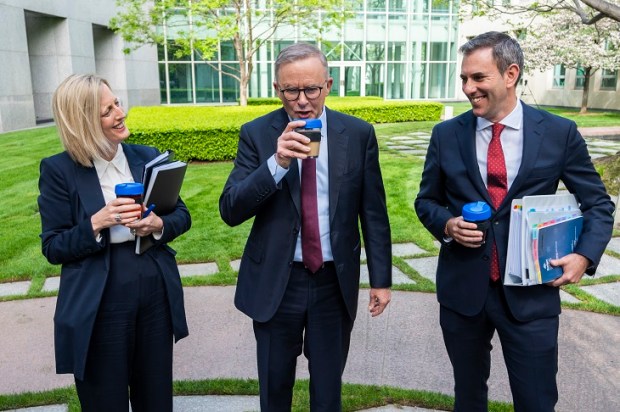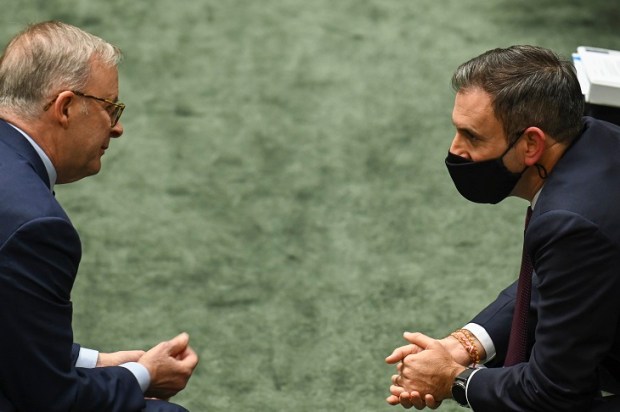This is the third of three articles examining the new Australian socialist experiment that is now well underway.
The first article provided an overview and discussed the capture of Australian capitalism by the socialists. The second article explained how the socialist agenda is about the elimination of competition within and across the Australian labour market.
This third article considers the quasi-nationalisation of entire business sectors. This involves the narrowing or elimination of market mechanisms. Independent business decision-making is largely removed to the point that business managers are becoming quasi-public servants implementing prescriptive government dictates. Herein is the rejection of ‘neo-liberalism’ in micro detail. Further, this article looks at the looming capture of key free-market protective institutions. These institutions are to have their free-market remits redirected to socialist goals and outcomes.
The three articles have particular currency given Treasurer Jim Chalmers’ paper announcing a ‘radical remake of capitalism’. It’s where he announced that ‘Labor will ditch the free market policy consensus that has steered rich countries over two generations’. He has promised that ‘2023 will be the year we build a better capitalism, uniquely Australian’.
In late 2022, the Australian gas industry received a rude shock. In what one business commentator referred to as a ‘quasi nationalisation of gas’, the federal government pushed through legislation that enables it to control the production, marketing, and pricing of gas by ministerial decree. Sounds like socialism? Looks like socialism? Maybe it is socialism!
The chief executive of one of Australia’s largest gas producers said the government was imposing a ‘Soviet-style policy’, with investment policy lining up with those of Venezuela and Nigeria. Other gas producers stated that the legislation has ‘the potential to choke gas supply … do nothing to increase supply’ and would potentially lead to ‘energy rationing and breaking LNG export contracts’. One business CEO declared that the government is ‘anti-business’.
In introducing the legislation the Prime Minister rounded against gas companies for ‘banking record profits and sending them offshore’. The government’s stated justification for the action is that the east coast energy market is broken. Further, that to fix this the government is requiring the Australian Competition and Consumer Commission to regulate gas prices.
What these business leaders have experienced is the sharp reality of the new Australian socialist experiment. The socialist thinking to which they have been subjected goes something like this.
The Greens, and more generally the green movement, are technological anarchists. That is, they view oil, gas, and coal as being industrial-revolution technologies that are destroying the planet and so destroying humanity. Their agenda is to remove the blight of this old technology from society, the economy, and the planet. They seek to replace this old technology with new technology.
Their notion of ‘market failure’ is the failure of the competitive market to remove the old technology and replace it with new technology. Within this paradigm they do not see themselves as ‘anti-business’. They are just ‘anti’ those businesses which they see as using the old technology purely for reasons of profit. In this paradigm those businesses are immoral and unfit to survive. Their answer is to recognise this ‘market failure’, remove ‘the market’ and replace it with state-imposed control. By most definitions this is socialism.
In comparison, the ‘old’ Keating/Kelty free market view would perhaps hold that there is plenty of gas in the ground on the east coast of Australia. The ‘market solution’ to high gas prices would be to increase supply, bring down prices, and give new technologies time to develop and take hold. However, this view is politically trounced by the counter-narrative that there is a technological crisis and that increased gas supply will worsen the crisis. This is amply demonstrated by the fact that there is plenty of readily accessible additional gas reserves in the ground on the east coast. If tapped, the gas supply crisis would be resolved. The large onshore reserves in Gippsland Victoria are just one example. Yet government refuses to release the reserves. Put simply, resolution of a gas shortage would work against the ambition to replace the old industrial-revolution energy technology with new technology. That is, the idea of ‘the market’ (let technologies compete) is rejected and replaced with monopoly (government will choose the technology). This is a key aspect of the new socialism.
It does not matter whether this socialist view is right or wrong. The Australian political reality is such that this technological-anarchist, socialist view has the political numbers and hence prevails. The voters have chosen. That’s democracy.
But it’s not just the politics that is the socialist’s enabler. Having captured capitalism by becoming capitalists, the socialists arguably hold an even bigger point of leverage than just raw political numbers.
Modern socialism is not poverty…
In controlling the biggest money game in town (superannuation) the capitalist–socialists don’t fear threats of investment blockages to energy production. That huge pool of the proletariat’s savings can be directed to (the right sort of) energy investment by the new Establishment, the socialist–capitalists. And with government-sanctioned mandates over those (acceptable) energy investments, profit should be had on the proletariat’s money.
But there’s another aspect. As perhaps the world’s most politically stable minerals mecca, Australia’s booming trade surplus is producing rivers of gold into government tax coffers. This provides comfort for the socialists because if the private sector fails to invest sufficiently in the right sort of technology, then government has, or will have, the money to carry out the investment. In fact, this approach is well underway.
The Victorian government is recreating the State Electricity Commission. In announcing the policy the Victorian Premier declared the ‘private multinational companies’ that own the current generators ‘sacked workers and sent profits offshore’ and that they ‘will bring back government-owned ownership of energy generation’. The announcement blames free-market-style business operations (which underpin the current Victorian electricity system) for Victoria’s energy woes. The announcement plays to the traditional socialist emotion that rapacious, profit-eating, mongrel business types exploit and harm workers and the populace. Further, that only monopolistic government can be trusted to do good for the people. It’s very traditional socialist imagery. And it appeals.
But there’s more. Socialism should no longer be identified with poverty. Socialism succeeds where there is wealth. Take many of the oil-rich middle eastern countries, Saudi Arabia, United Arab Emirates, and so on. In these countries citizens (however carefully defined) do not live in poverty. Quite the opposite. It is common for education and high-quality health care to be totally free. When couples marry, the state grants them a house, and not just token houses but McMansions. Sure, the proletariat doesn’t rule. Rule is by authoritarian monarchs. But what they practice is socialism with Saudi Arabian (or) United Arab Emirates characteristics.
What is common with each of these ‘socialist’ nations is that the socialists have captured capitalism, enabled monopoly through political fiat, and limited or curtailed competition so that the prevailing political, economic, and other orthodoxy (the Establishment) is not challenged by competition. That is the process underway in the development of this new experiment with socialism in Australia.
Treasurer Jim Chalmers explains how this is to work and is already underway. He says government will ‘design markets, (and) facilitate flows of capital into priority areas’. He refers to ‘co-investment’ as ‘a powerful tool at our disposal’. He intends to apply ‘this co-investment model in more areas of the economy with programs already underway in the [energy] industry, housing, and electricity sectors.’ He refers to investors being ‘more aligned with their values, and our national goals’.
That is, Chalmers is expressing confidence that investors will willingly partner with government in this ‘new capitalism’. He has reason to be confident given the scale, influence, and institutional alignment of the $3.3 trillion superannuation sector with this new capitalist/socialist Establishment.
There are other tools in this new socialist agenda. Those CEOs and business leaders who criticise this socialist agenda as it unfolds are dispensable. It works like this. Now that the socialists have captured Australian capitalism and, along with it, government coffers awash with trade surplus tax revenues, the financial dependency equation is not what it once was. Big business needs the socialists more than the socialists need big business.
The socialists’ thinking goes like this. Large companies will always want to invest, particularly in politically stable Australia. They might complain (about the quasi-nationalisation of gas, for example) but they’ll ultimately come begging to spend their money. Government controls approvals for projects. So only corporates who kowtow to the new socialism will find project favour. If the incumbent corporates aren’t compliant, there are always plenty of other corporate fish in the global financial sea. But more, Australian superannuation funds are strategic investors in the corporates. Non-(socialist) compliant executives can always be quietly moved on over time. It happens. Whether this is healthy for the economy or not, or whether this is right or not, is not the issue. The new Australian socialists are confident of their position. That’s all that matters.
Within this socialist confidence, keep an eye on what’s being proposed in the private domestic rental market.
The 2022 federal election delivered a high point for the Greens in terms of votes – 12.6 per cent or 1.9 million voters. The Greens are clearly a major political force.
Foremost amongst the Greens’ national election campaign policies was a policy to freeze rents. Their housing policy focus is on public housing – that is, housing owned by government and rented to the public. The Greens are against ‘a housing system that makes massive profits for property developers and banks’. As part of this policy, they are calling for a freeze on rents.
According to tax returns, there are 2.2 million individual property investors in Australia with 71 per cent of individuals (1.57 million) owning just one property and 19 per cent (418,000) owning two properties. 2.4 million households rent from private landlords. That is, of the total private rental market at least 1.98 million households rent from 1.98 million landlords who are simply individuals. It’s the proletariat renting to the proletariat.
The Greens rent freeze policy is socialistic without doubt. It is a policy that removes control of an individual’s property (that they own) and transfers that control to the state. It is a policy that says that private (rental investment) property ownership, even by individuals, is not acceptable. It is a policy to remove competitive dynamics in the rental property market and to create monopoly control of rents in the hands of government. It is a policy of quasi-nationalisation of private property in the rental market.
Given the strategic, political grunt of the Greens, this must be considered much more than simply policy leaves blowing in the wind. This is real stuff that should be considered likely to be implemented in one form or another.
Free-market Institutional capture, ‘re-alignment’ and removal
There are several important institutions that are tasked with ensuring that the Australian economy conforms to a competitive, anti-monopoly, free-market model. Those institutions look at the detail of things that happen in the economy and have legislative power to impose determinations to achieve those objectives. Those institutions are already under attack to diminish their capacity as free-market influencers.
Australian Building and Construction Commission: The ABCC was the regulator that had jurisdiction over the commercial construction sector. Its task was to prevent unions and construction firms from acting in monopolistic ways. It was abolished in late 2022.
Australian Administrative Appeals Tribunal: The AAT is a government body that reviews and makes decisions on government agency treatment of individuals and entities. It operates under a tribunal system akin to a lower-level court. The AAT was abolished in late 2022 on the grounds that the Tribunal was stacked with political appointments from the previous government. All existing Tribunal members have gone. A new Tribunal is being set up with the government appointing members. Most likely the reason for this is that the government has an agenda for socialist change that could result in large numbers of complaints and appeals to the Tribunal. In anticipation of this, the government has moved to ensure that the old AAT would not be in a position to thwart or frustrate the government’s agenda.
Australian Consumer and Competition Commission: The ACCC is the most powerful watchdog of competition in the Australian institutional arsenal. One of its primary tasks is to oversee and prevent price collusion and price-fixing across sectors and businesses in the economy. In the quasi-nationalisation of the gas industry the ACCC has been charged with ensuring that government-mandated price-fixing processes are implemented. In other words, the competition watchdog is now being used to implement the socialist agenda of suppressing competition across the gas sector.
Productivity Commission: The Australian Productivity Commission (PC) is a government-funded, free-market think-tank. A campaign is underway to curtail, even close, the Commission on the alleged grounds that the Commission is ‘pushing outdated economic ideologies’. In socialists’ eyes, the Commission is an institutional enemy, as it consistently produces detailed reports and recommendations to government on aspects of the Australian economy which promote a free-market, regulatory agenda. It doesn’t appear that the Commission will be abolished but its charter is to be changed. Treasurer Chalmers has been clear about this, stating that he intends to ‘renew and revitalise the Productivity Commission as a powerful think tank advising government on productivity, as well as prosperity and progress more broadly’.
Expect big changes in Commission staff and its remit so that its pro-competition voice is muted, neutered, or even shifted to the justification of the elimination of competition.
The Reserve Bank: Since the 1990s the Reserve Bank of Australia (RBA) has made decisions on macroeconomic policy independent of political direction. Its charter is being reviewed for the first time since its independence. Treasurer Chalmers has stated his intent to ‘renovate the Reserve Bank’. What this means is yet to be revealed.
It’s evident that a new Australian socialist experiment is now well underway. It’s unique. It’s socialism with Australian characteristics.
These three articles have sought to explore the socialists’ thinking behind this experiment and why the socialists are confident that their vision will work and will deliver benefit to the Australian community.
Ken Phillips is Executive Director of Self Employed Australia
Got something to add? Join the discussion and comment below.
Get 10 issues for just $10
Subscribe to The Spectator Australia today for the next 10 magazine issues, plus full online access, for just $10.


























Comments
Don't miss out
Join the conversation with other Spectator Australia readers. Subscribe to leave a comment.
SUBSCRIBEAlready a subscriber? Log in